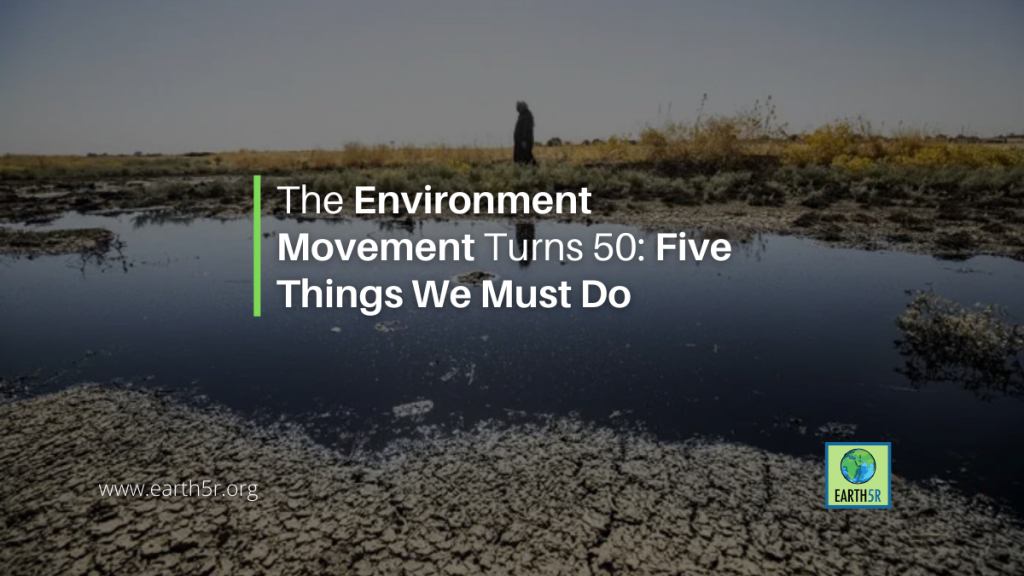
The Environment Movement Turns 50: Five Things We Must Do
Stockholm+50 is taking place 50 years after the original Stockholm Conference on the Human Environment, which many consider the starting point of the modern environmental movement. The original conference wasn’t just about the environment, of course. It was about how harming the environment harms development and causes poverty, and how poverty reduction is key to addressing environmental harm.
Stockholm+50 is also not just about the environment. It is about how nurturing the environment can lessen poverty and help the world achieve sustainable development goals. So, this is the moment to reimagine and create a fairer economic system, reinvent the structures that have caused environmental degradation, and create a global society that offers everyone the opportunity to live a healthy, fair life. Here are five ideas on how we can do so over the next 50 years – starting with the political commitment to act at Stockholm+50.
We cannot continue with fossil fuels, but we also must tackle energy poverty. 759 million people have no access to electricity and 2.6 billion people depend on polluting cookstoves and fuels. The answer is to move to renewable energy, coupled with more energy efficiency and expanded energy access. Renewable energy costs are lower than fossil fuel costs. However, just because proven technologies exist, it doesn’t mean the market will respond. Only good public policies and much more investment will make markets move. Equally, countries have different types of resources, be they wind, solar, geothermal, or hydropower. It is about horses for courses – backed by international cooperation and multilateralism to connect systems and create cross-border transmission lines, as well as off-grid energy solutions.
Economist Kenneth Boulding pioneered these concepts in 1966. The idea is to stop behaving like cowboys in the Wild West, who would exhaust the resources in an area before moving on and start behaving like astronauts on a spaceship with limited resources. After all, nobody is leaving this planet – aside from a few billionaires, and even they are only popping into space for a little jaunt.
How do we do this? Businesses can report and act on nature-related risks (more on this later). Consumers can take decisions informed by the impact their purchases have on the natural world that supports them. We can increase investments in nature. Crucially, embedding nature in every economic decision would make us stewards of the environment – with an understanding that the health of the economy is dependent on the health of nature.
The right to a clean and healthy environment matters because it compels governments, businesses, and institutions to respect, protect and fulfill that right. Enforcing this right could change so much. It could reduce pollution, which affects human health and is a significant cost to health systems. It could protect environmental defenders and Indigenous peoples from persecution. It could make our cities more liveable by creating “20-minute neighborhoods” in which residents can quickly walk or cycle to any of their basic needs. Guaranteeing the right to a clean and healthy environment could change everything.
Digital technologies can empower people, governments, and businesses to make more sustainable choices. This will require making environmental data open and accessible as the basis for decision-making. It will require new digital product passports so that the environmental footprint of products and services can be calculated across their supply chains. It will require major investments in ensuring that digital technologies benefit everyone. Ultimately, it will require us to unite the digital transition and the sustainability transition.
Financial systems should only finance initiatives that benefit the planet and by extension humanity. Central banks and regulators should have a planetary and climate stability mandate because, without planetary stability, you can’t have financial stability. Regulators are beginning to understand that climate risks cause financial risks. We are at an initial stage, with disclosure of climate-related financials on the rise. What we really need is for regulators to ask market participants to set net-zero targets – with real plans and real timelines. And this is not just about carbon. In parallel, “no-net loss” of biodiversity and “no polluting the environment” targets should be integrated into the financial system.
These ideas, and many more that will be shared in Stockholm+50, can transform our societies and economies to live in harmony with nature. This won’t end the war – but it will reduce the triggers for war by creating prosperity for many more people. This won’t end pandemics – but it will reduce the risks of them happening and the impacts when they do. This won’t create a world in which everybody can have whatever they want whenever they want – but it will lessen poverty, create more equity and more opportunity, and allow future generations to inherit a living planet.
What Is Earth5R’s Home Equals Planet Project?
Home Equals Planet is an initiative comprising 15 tangible actions that citizens take on an individual level. These are a step toward a sustainable planet and a healthier lifestyle. The actions promote simple actions like eating home-cooked food, segregating waste, spending time in nature, and so on.
The 15 actions are associated with the UN Sustainable Development Goals and aim to create a better future for all by 2030. Home Equals Planet covers areas like Waste Management, Health, creating a Circular Economy, etc.
To read more of such articles, please visit https://earth5r.org.
Source: Geo News




